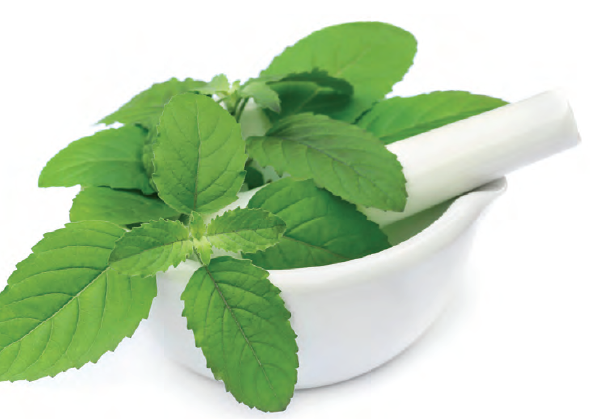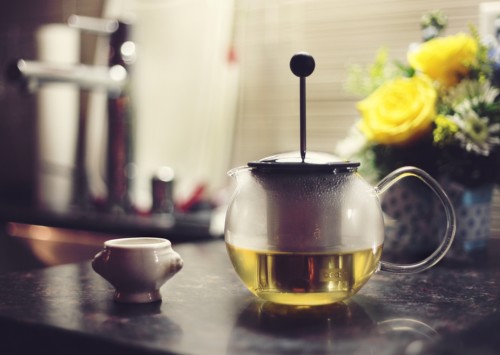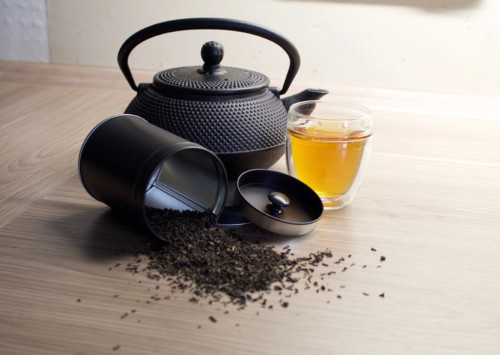Holy Basil
India & You
March-April 2017
For several thousand years now, Tulsi is being worshipped in India as a sacred form of goddess Lakshmi and is also used as a traditional medicine. However, not only therapeutic properties, but the holy basil also has skin and hair benefits as well as purifying powers to strife off viruses and bacteria.
There is undoubtedly no end to the curing herbs, native to India, which are well known for their healing powers. However, Tulsi stands apart.
Tulsi, which is the Sanskrit word for ‘the incomparable one’, also known as the holy basil or Ocimum Sanctum, is an easy-to-grow plant. It is a common name in most Indian households and the leaf is indigenous to the Indian subcontinent and is widely cultivated throughout the Southeast Asian tropics. It is preferred in India not only as an antidote to cure acute diseases, but is also used as a beverage condiment.
Tulsi has been historically used in the country for its medicinal properties that are said to be anti-fungal, anti-bacterial and antiviral. But, not narrowing its worth to just curing, the plant is also used to repel insects, offers multiple beauty benefits, strengthens the immune system, forms an important element for Ayurveda and is also worshipped as a symbol of purity.
The sacred connect
Tulsi has been revered as one of the most hallowed herbs in India, instilled with restorative power. Hindus view the plant as a form of Goddess Lakshmi bestowed with great spiritual powers. According to the Hindu mythological tales, not even a huge amount of gold could outweigh Lord Krishna’s power, but a single Tulsi leaf did just that. The aromatic plant is thus cultivated for many religious practices in the country apart from medicinal purposes and for its essential oil.
Following the traditions, Tulsi is still traditionally grown in every household for worshipping and consuming in contemporary India. Sipping a cup of tea made with Tulsi leaves and adding two grams of black pepper to it helps to build immunity, acts as an antibacterial and facilitates recovery from dengue. Kadha – a blend of ginger, Tulsi leaves and crushed peppercorn in boiling water is usually used as a brew to put most illnesses straight, especially cough and cold. The essential oils found in the leaf effectively act on respiratory system and the antioxidants help in reducing stress levels, diabetes and high blood pressure.
“Pluck, wash and consume three-four Tulsi leaves every alternate day and you will probably stay at a safe distance from fever, headaches and chest congestion. It will also give you healthy gums,” says 75-year-old Baldev Raj, who follows the routine every morning without fail.
According to Ayurveda, not only the leaves but the basil seeds also help control blood pressure, diabetes and weight gain. Just add two teaspoons of basil seeds to one cup of warm water or any liquid of your choice. Allow the mixture to stand for two minutes and consume. Loaded with Vitamin A and C, Tulsi acts as a detoxifying and purifying agent and helps regulate uric acid levels in the body, thus, reducing the possibilities of developing kidney stones.
Redefine your skin
Brimming with linoleic acid, the plant can treat various hair and skin disorders. Commonly paired with other herbs like neem and turmeric, when applied on acne and pimples, Tulsi paste can ensure relief. Just apply a paste of these leaves mixed with sandalwood paste, neem paste or rose water, leave for 15-20 minutes and rinse with water.
For a blemish free skin, mix one egg white with paste of Tulsi leaves and gently scrub particularly on the infected areas of the skin. Wash off after 20 minutes and the egg white will tighten the pores while the Tulsi paste will disinfect the skin and prevent infection causing pimples and acne. This also helps in purifying blood by removing toxins, lightens scars and adds glow to the face.
For those who are worried about hair loss, make a paste of basil leaves and add it to your hair oil. Apply on your scalp to reduce itchiness, dandruff and catalyse hair growth by improving circulation in your head. On the other hand, soak the powder of dry basil leaves and amla (gooseberry) in water overnight and wash your hair with it after straining it the next morning for greying hair.
However, the leaf must be used in moderate amounts as when consumed in excess, it can lead to eugenol overdose that can lead to poisoning. “Excessive consumption of Tulsi can harm pregnant women as it can have long term effects both on the mother and the baby, and can also lead to complications in menstruation. However, with the right amount of consumption, Tulsi is beneficial for health,” says Dr D Banerjee, a Homeopathic practitioner in New Delhi.













